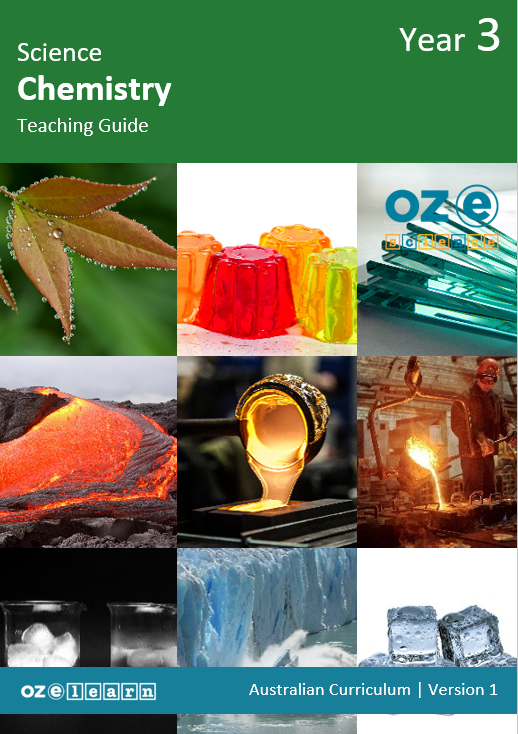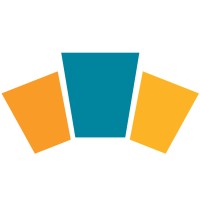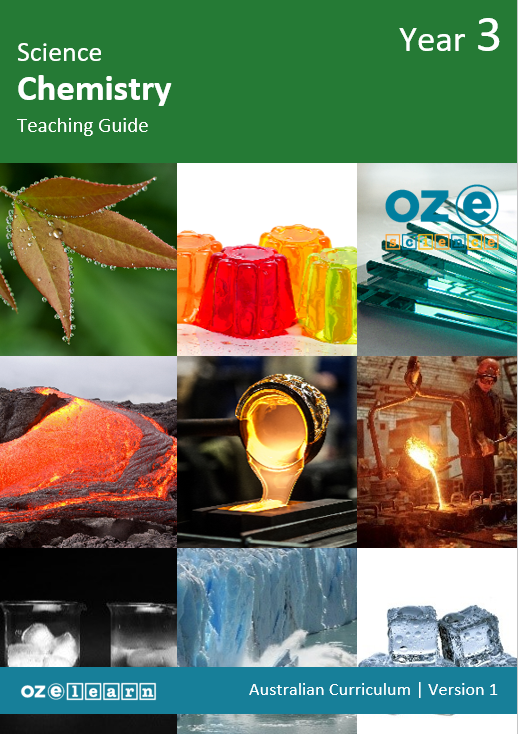Oz-e-science Years F–6
Chemistry Year 3

Overview
Chemistry Year 3 is a Chemical Sciences curriculum program for Year 3 students. It aligns to the Australian Curriculum Science Understanding:
- A change of state between solid and liquid can be caused by adding or removing heat (ACSSU046)
Note: This curriculum program is currently being updated to align with the Australian Curriculum 9.0, updated versions will be released in early 2024.
Success criteria
- Describe the difference between solids, liquids, and gases.
- Observe examples of a solid, a liquid and a gas.
- Describe the states of matter by their particle organisation.
- Represent the particle organisation of solids, liquids and gases.
- Record the changes in state for different materials when heat energy is added.
- Describe the process of heating liquids using different examples.
- Observe (look at) the process of saltwater evaporation.
- Record the changes in state for different materials when we take away heat energy.
- Describe the process of cooling gases using different examples.
- Observe (look at) the process of condensation.
- Describe the states of matter at each step of recycling.
- Plan the steps in the investigation.
- Conduct the experiment (test) and make observations.
- Record the results of an experiment, evaluate it and communicate findings.
Learning objectives
In Lessons 1 to 9, students learn about:
- solids, liquids and gases.
- classifying solids, liquids and gases.
- the particles in matter.
- identifying the states of matter based on their properties.
- and observe what happens when heat is applied to solids.
- what happens when heat is applied to liquids.
- and observe what happens when liquids are cooled.
- what happens when gases are cooled.
- how changes in states of matter help recycling.
- setting up the solids, liquids and gases experiment.
- creating a poster about the solids, liquids and gases experiments.
Resources
Teaching resources
Lessons
Teaching Guide
Student Workbook
Recital List
Extra resources
Classroom posters
Element Club Handbook
Assessment
Progress tests
Progress tests are conducted after every second lesson, allowing teachers to monitor student understanding of the concepts taught over the past two lessons and to identify where reteaching is needed.
The Teaching Guide contains the testing questions, and the Student Workbook has a section where students write their answers and score themselves. Structured Research Activity
The Structured Research Activity (SRA) for this unit is: Students plan and conduct an experiment observing a solid, a liquid and a gas; develop a poster including observations and evaluation about their experiment. The SRA takes place over two lessons so students can apply the Science Understanding and Science Inquiry Skills covered in the unit.
Teachers use the Guide to Making Judgements, which is included in the Teaching Guide, to mark the SRA.
End-of-unit assessment
The last lesson is the end-of-unit assessment, which has a variety of question formats (e.g. label the diagram, circle the correct answer) to assess student mastery of content from the unit. The end-of-unit assessment is in the Teaching Guide. Teachers copy the assessment and distribute to students at testing time
Explicit instruction for Science
Oz-e-science uses a teaching approach and curriculum that uses explicit teaching of content knowledge of science and explicit teaching and practical scientific inquiry using the Scientific Method. Read more about pedagogy here.
Complete This Unit
Lesson 1 States of Matter
Lesson 2 Properties of Matter
Lesson 3 Changing States
Lesson 4 Liquid and Heat
Lesson 5 Liquid and Cooling
Lesson 6 Gases and Cooling
Lesson 7 States of Matter and Recycling
Lesson 8 Investigation
Lesson 9 Investigation


